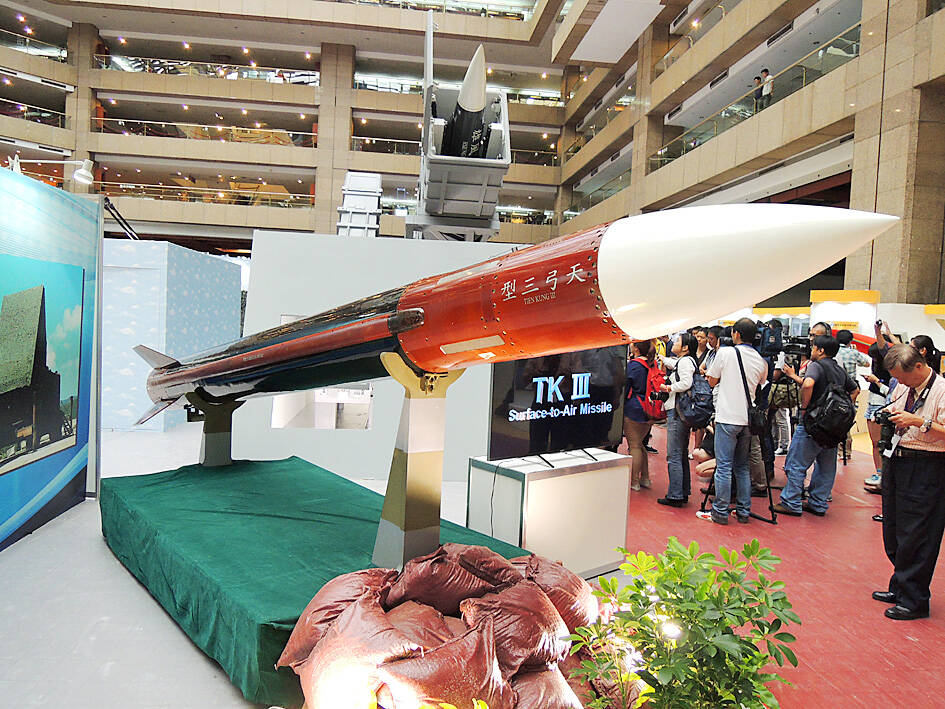The military’s new Tien Kung IV (Sky Bow IV) missiles have completed initial operational evaluation and limited field testing, with mass production expected to start next year, a defense official said yesterday.
Created by the Chungshan Institute of Science and Technology’s Strong Bow (強弓) program, the Tien Kung IV system is a new air defense weapon with a maximum altitude of 70km, the source said on condition of anonymity.
This marks a significant improvement over the Tien Kung III and the PAC-3 Missile Segment Enhancement systems, which have maximum altitudes of 45km and 60km respectively, they said.

Photo: Lo Tien-pin, Taipei Times
The Tien Kung IV’s enhanced capability allows the system to intercept high-flying cruise missiles and ballistic missiles with a higher probability of success, they said.
The quantity of Tien Kung IV systems to be purchased is yet to be decided, although the Tien Kung III system’s mass production would cease early next year, as its NT$27.4 billion (US$908.1 million) budget is expected to be all but exhausted by December, they said.
The Ministry of National Defense aims to develop two additional weapon systems with the Strong Bow program, including an air defense missile with a maximum altitude of 100km and a surface-to-surface missile with a range of 1,000km, they said.
Separately, the armed forces are planning an unprecedented move to increase defense spending to 3 percent of GDP to meet targets set by the US, a source familiar with the matter said.
The ministry has a NT$247.2 billion special budget to buy 66 F-16C/D Block 70 jets and a NT$388.3 billion special budget on various domestically manufactured missile systems.
Next year, the ministry plans to allocate NT$116.4 billion to harden military telecommunications hubs and command centers, and improve training facilities as part of the Cabinet’s special project to bolster national resilience, they said.
The ministry also plans to allocate NT$500 billion to buy US arms, with a plan to be unveiled in late August, they said.
The armed forces would invest in other domestic programs, including Albatross uncrewed aerial vehicles, second-generation Kestrel anti-armor rocket launchers and launching more assembly lines for 155mm artillery shells, they said.

AGING: As of last month, people aged 65 or older accounted for 20.06 percent of the total population and the number of couples who got married fell by 18,685 from 2024 Taiwan has surpassed South Korea as the country least willing to have children, with an annual crude birthrate of 4.62 per 1,000 people, Ministry of the Interior data showed yesterday. The nation was previously ranked the second-lowest country in terms of total fertility rate, or the average number of children a woman has in her lifetime. However, South Korea’s fertility rate began to recover from 2023, with total fertility rate rising from 0.72 and estimated to reach 0.82 to 0.85 by last year, and the crude birthrate projected at 6.7 per 1,000 people. Japan’s crude birthrate was projected to fall below six,

Conflict with Taiwan could leave China with “massive economic disruption, catastrophic military losses, significant social unrest, and devastating sanctions,” a US think tank said in a report released on Monday. The German Marshall Fund released a report titled If China Attacks Taiwan: The Consequences for China of “Minor Conflict” and “Major War” Scenarios. The report details the “massive” economic, military, social and international costs to China in the event of a minor conflict or major war with Taiwan, estimating that the Chinese People’s Liberation Army (PLA) could sustain losses of more than half of its active-duty ground forces, including 100,000 troops. Understanding Chinese

SELF-DEFENSE: Tokyo has accelerated its spending goal and its defense minister said the nation needs to discuss whether it should develop nuclear-powered submarines China is ramping up objections to what it sees as Japan’s desire to acquire nuclear weapons, despite Tokyo’s longstanding renunciation of such arms, deepening another fissure in the two neighbors’ increasingly tense ties. In what appears to be a concerted effort, China’s foreign and defense ministries issued statements on Thursday condemning alleged remilitarism efforts by Tokyo. The remarks came as two of the country’s top think tanks jointly issued a 29-page report framing actions by “right-wing forces” in Japan as posing a “serious threat” to world peace. While that report did not define “right-wing forces,” the Chinese Ministry of Foreign Affairs was

US President Donald Trump in an interview with the New York Times published on Thursday said that “it’s up to” Chinese President Xi Jinping (習近平) what China does on Taiwan, but that he would be “very unhappy” with a change in the “status quo.” “He [Xi] considers it to be a part of China, and that’s up to him what he’s going to be doing, but I’ve expressed to him that I would be very unhappy if he did that, and I don’t think he’ll do that. I hope he doesn’t do that,” Trump said. Trump made the comments in the context